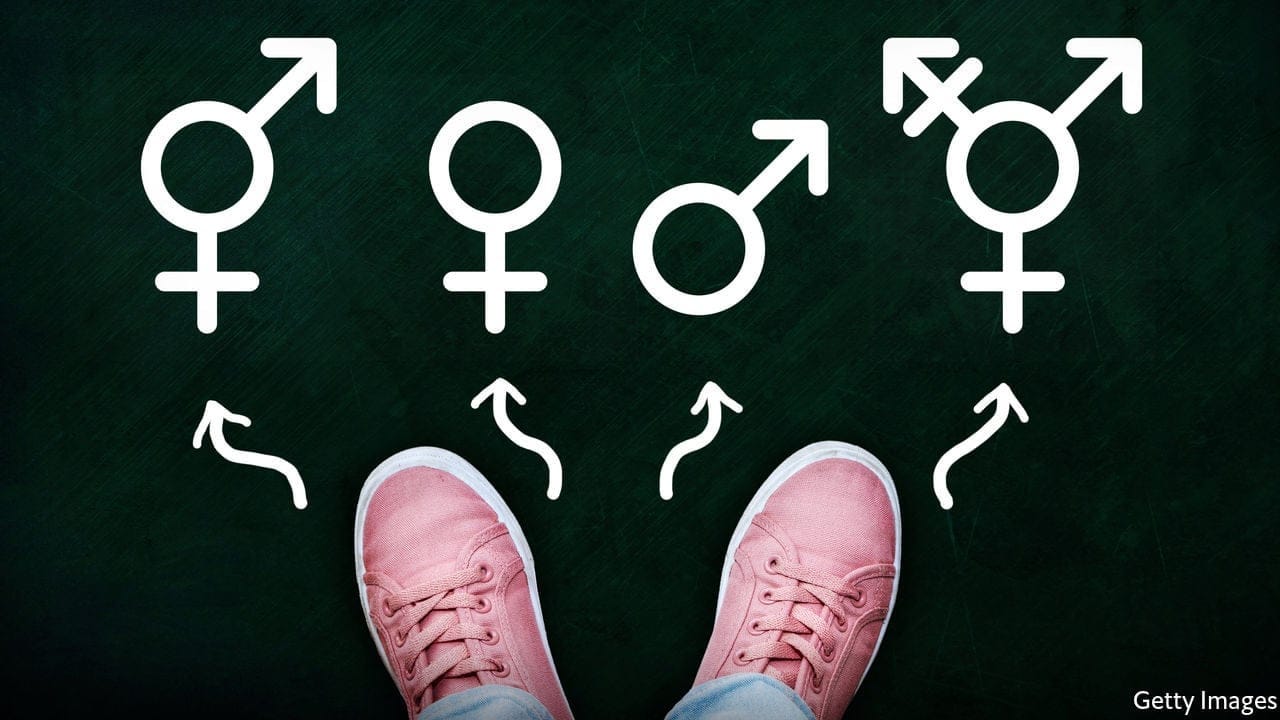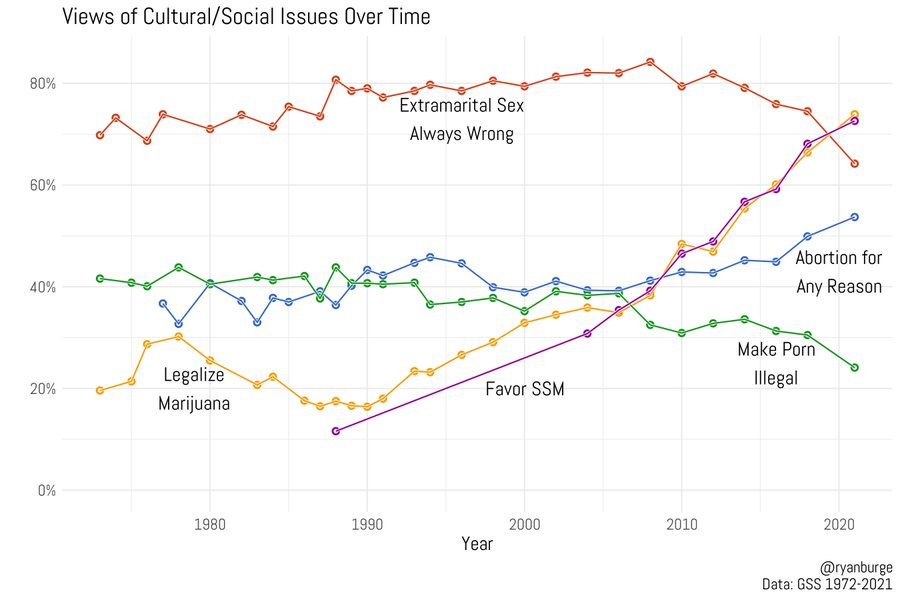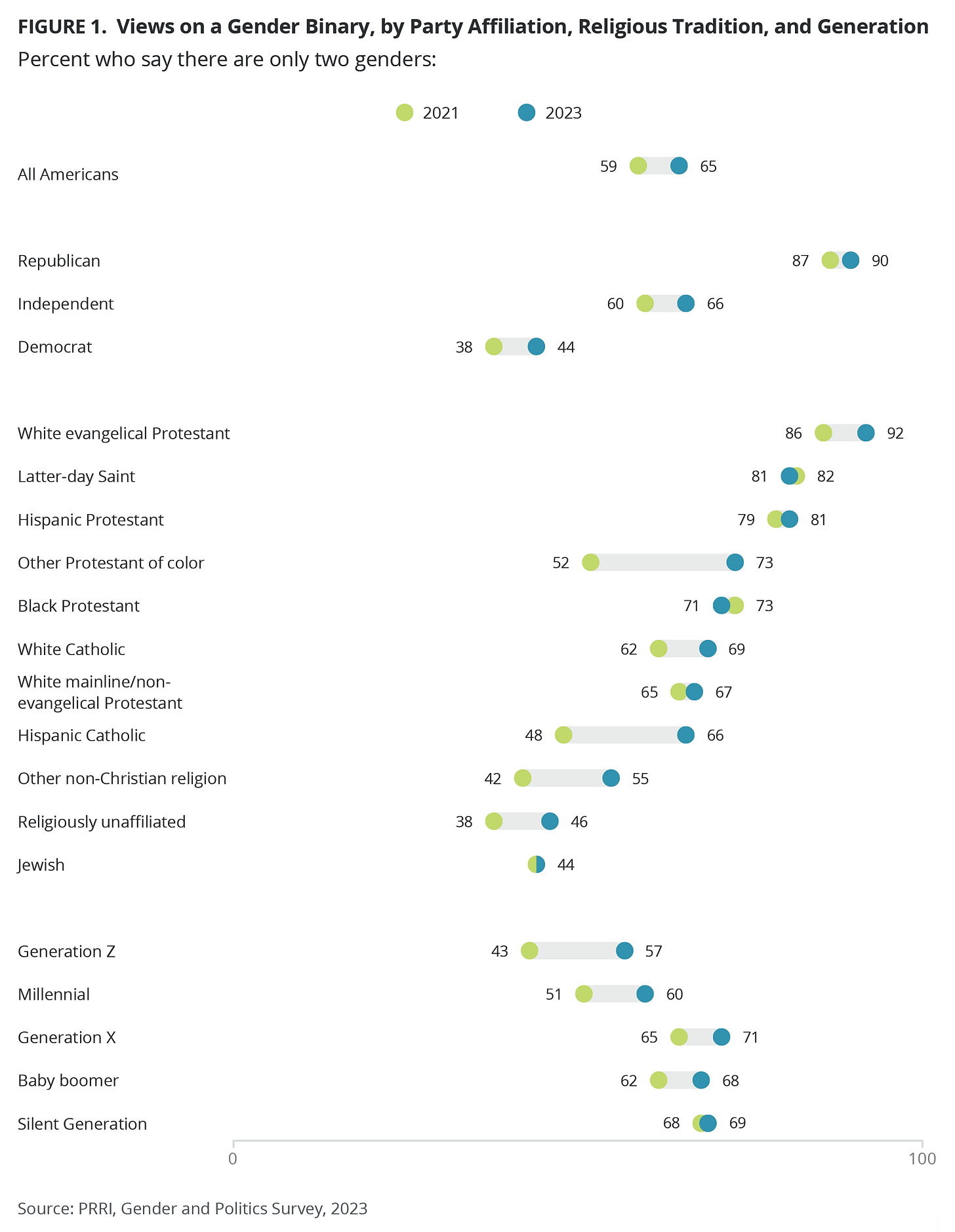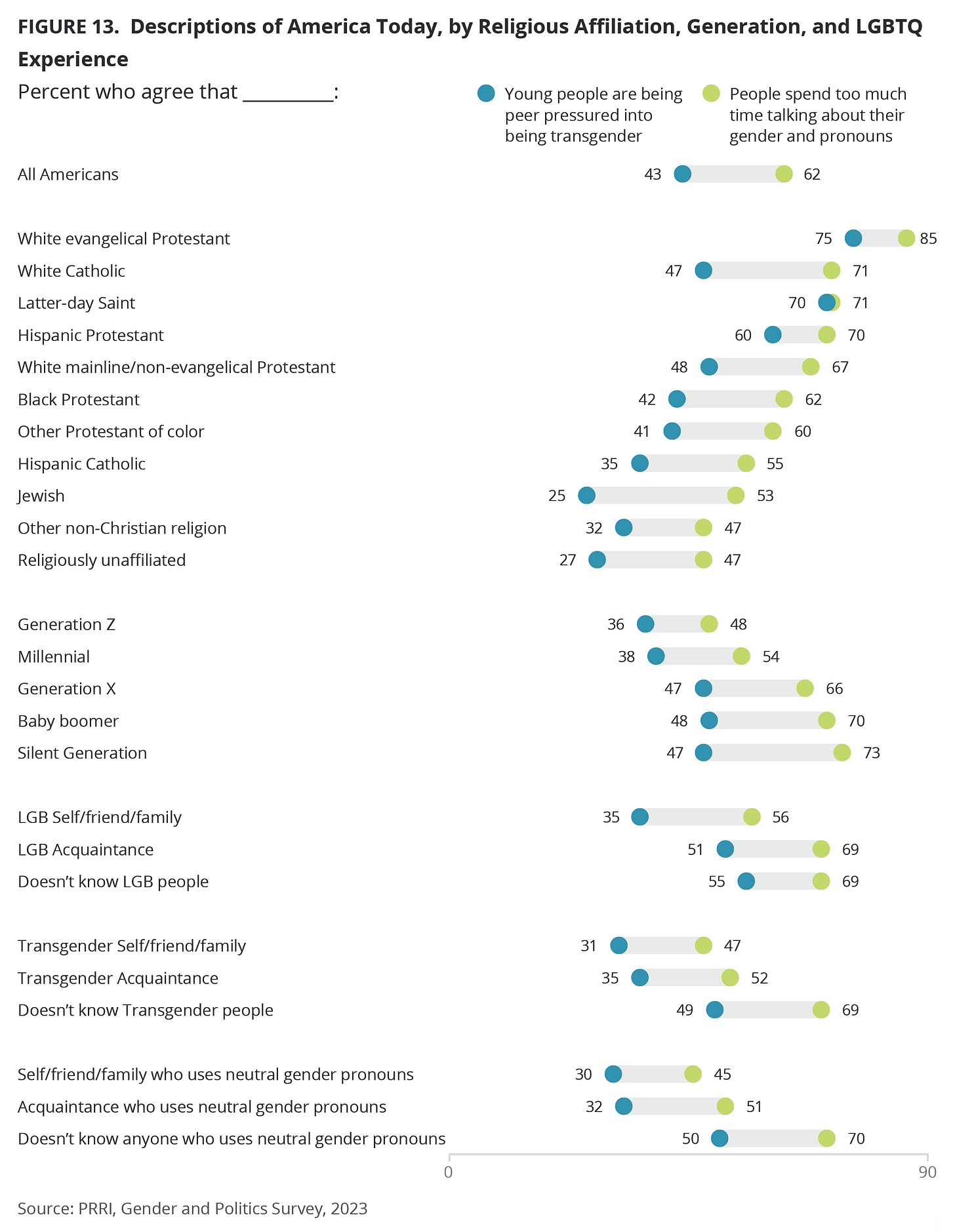Americans are becoming more socially liberal—with one glaring exception
Digging into one major fault line in the culture wars
Over the past several decades, America has steadily grown more liberal across a host of social issues. As religion scholar Ryan Burge has found, the public today is more open-minded (or, depending on your politics, permissive) than at any time since at least the 1970s on abortion rights, same-sex marriage, legal marijuana, legal pornography, and even the morality of extramarital sex:
Much of this movement occurred over just the past decade and represents an astounding turnaround from the several decades that preceded it, especially on issues related to LGBT rights. As I’m sure many readers will know, social conservatism was the dominant ethos in American life for at least half a century, from McCarthyism and the “red scare” to the “moral majority” that twice helped elect Ronald Reagan president in landslides; from “just say no” and D.A.R.E. to tough anti-drug and anti-welfare laws that disproportionately impacted African Americans; and from the anti-gay environment of the 1990s that led to the Defense of Marriage Act and “Don’t Ask, Don’t Tell” to the slightly-less-anti-gay environment of 2004, when George W. Bush still saw it in his political interest to push for ballot measures banning same-sex marriage in states that were key to his re-election prospects.
After nearly 60 years of conservatives’ cultural rule, however, things more or less turned on a dime during the Obama era, marked most clearly by the country’s growing acceptance of gay people and support for same-sex marriage and other measures designed to advance the cause of equality. Perhaps the most important sign of progress on this front was when President Obama and his vice president—Joe Biden—became the first White House duo to not only endorse gay marriage but to win re-election after doing so.
The country’s leftward cultural shift continued at a rapid pace during the 2010s (and was almost surely accelerated by the election of Donald Trump). Seemingly overnight, liberals had wrested control over the culture away from conservatives. It is virtually indisputable that the centers of power within most major institutions today are largely controlled by liberally minded individuals (if they weren’t already): Hollywood, the arts, colleges and universities, nonprofits, the mainstream media, and even to some extent corporations.1
In other words, as Burge maintains, liberals have won the culture war.
However, even as more Americans have embraced socially liberal attitudes and values on a range of topics, there is one key set of issues that has largely arisen over the past decade for which this leftward swing has so far not materialized: those relating to “gender identity.” Recent polling has shown that on several of these questions, the public actually holds less liberal attitudes. And, to the extent that these attitudes have changed, they’ve become more skeptical of views held by many cultural progressives.
For example, according to a May 2022 survey by the Pew Research Center, the share of the public that agreed with the statement “whether a person is a man or woman is determined by sex at birth” grew steadily between 2017 (54%) and 2022 (60%). And both the Pew survey and a May 2023 Washington Post poll found that sizable majorities of Americans believed, among other things, that transgender girls and women should not be allowed to compete in sports at any level against other girls and women; lessons on gender identity should not be introduced to students until at least middle school, if not high school; and gender medicine such as puberty blockers and hormone treatments should not be accessible to minors.
Most recently, the Public Religion Research Institute (PRRI) released an extensive survey report that gauged public attitudes on a host of questions related to gender identity, and it included a couple of striking findings. First, nearly every group across partisan affiliation, religion, and generation was more likely today than two years ago to believe that there are only two genders.
On the whole, two-thirds (65%) of Americans held this view. Some of the biggest movement on this question came from groups traditionally thought to be among the most liberal, such as Gen Z and Americans of color. In just three groups—Democrats, religiously unaffiliated individuals, and Jewish people—was that figure below 50% (and even among each of these groups, it was still above 40%).
Most Americans (62%) also thought that “people spend too much time talking about their gender and pronouns.” Again, this was true across all but a few demographic groups. However, here, PRRI also included breakdowns for LGBT individuals and people who are close to them. Interestingly, fully 56% of gay, lesbian, and bisexual Americans and/or their friends and family agreed with this sentiment, as did nearly half (47%) of transgender individuals and/or their friends and family.
Despite the public’s skepticism on some of these issues, many people also oppose legal discrimination against gender minorities. Both the Pew and Washington Post polls found that huge majorities of respondents supported making it illegal to discriminate against transgender individuals in things like housing, the workplace, institutions of higher education and K–12 schools, and the U.S. military. Significant shares also supported access to counseling or therapy for gender-questioning youth. Additionally, in the PRRI survey, younger generations were much likelier than older ones to be comfortable with the idea of having a friend who is transgender or uses gender-neutral pronouns.
It remains pretty clear, though, that a sizable share of Americans have not yet been convinced by the more progressive arguments being made about sex, gender, and identity, or about policy trade-offs related to those issues. It also seems obvious that the only way activists will make progress in their direction is if we see much more public discussion about all this, not less—and discussion that makes room for good-faith questions and concerns to be aired.2
Recently, a group called the American Public Square (APS), which is based in my home town of Kansas City, attempted to do just this by scheduling a diverse panel of voices to discuss these very issues.3 The event, scheduled to take place last night, was called “Exploring Gender & Identities,” and a preview of it was summarized as follows:
Issues of gender identity and gender expression have become increasingly divisive in American culture. While the transgender community is being targeted by legislation in both Kansas and Missouri that aims to restrict their rights and access, communities are struggling with how to balance rights and access for all, especially when it comes to impacts on women and minors. How can we navigate the myriad avenues of this conversation with respect and compassion?
This seemed eminently reasonable and productive—the exact kind of event necessary to better inform the public. However, the discussion ultimately didn’t happen. One of the invited panelists, a local LGBTQ activist, apparently reneged on his obligation at the eleventh hour because, in his telling, one of the other participants was someone he deemed an anti-trans bigot.4 That participant, a woman named Jamie Reed, was a whistleblower who used to work at the Washington University Transgender Center, and her claims that the center provided sloppy care and did not follow proper guidelines for administering youth gender medicine have been the subject of much debate. (It’s worth noting that Reed is herself queer and married to a trans man.)
Rather than take this opportunity to be a voice speaking on behalf of much of the LGBTQ community and challenging views he disagreed with, the activist decided to make a spectacle out of it. After the other panelists on his side of the debate followed his lead and bowed out as well, APS felt they could not move forward with a balanced discussion and canceled the event entirely, leading the activist to admit he was “happy to help sink it.” This deprived community members (and others) of the chance to hear a robust, moderated conversation about a pressing set of issues that have recently been at the heart of the nation’s culture war.
It is up to folks like this activist to decide how they wish to go about changing their fellow Americans’ minds on these issues. Certainly, they are within their right to refuse to engage others on any level, especially if one is convinced that people who think differently are bigots. But as recent opinion polling has shown, these methods don’t appear to be working. In fact, they may be doing the opposite.
Arguably, the only institutions today in which the dominant milieu is not obviously liberal are the federal government (one of the only places where the question of who holds power is decided by the entire country), the courts (though that could be changing), and policing.
APS is a nonpartisan organization affiliated with William Jewell College, and they are no stranger to hosting conversations about difficult topics (including, most recently, the need for reparations for slavery).
I have intentionally chosen not to explicitly mention this activist’s name on advisement that it may draw unnecessary attention to this blog.






"It remains pretty clear, though, that a sizable share of Americans have not yet been convinced by the more progressive arguments being made about sex, gender, and identity, or about policy trade-offs related to those issues."
That's because they haven't been arguments, they've been proclamations. The time for the public discussion you want would have been BEFORE the proclamations. It's too late now.
To whom you are attracted sexually is purely subjective and therefore cannot reasonably be contested by an outside observer.
Where you decide to live your life on a spectrum of superficial, stereotypical male to female attributes (and we all do) is also purely subjective and similarly cannot be questioned.
However, your biological sex reflects an objective reality which cannot be changed by your subjective personal view and futile attempts to do so can result in serious health impacts to you as well as harms to members of the sex you are impersonating (primarily women).
Others who are grounded in objective reality should never be forced to accept your subjective version of your actual biological sex.
Finally, it's past time for the LGB community to separate themselves from the trans activists who are trying to take away the rights of women to fairness in sports and to privacy and safety in their restrooms, locker rooms and prisons. They also advocate for the chemical and surgical mutilation of children many of whom would grow up gay.
Their actions are evil and the
understandable negative reaction to the harm they are causing is spilling over to innocent people who are just going about their business, marrying and leading their lives.